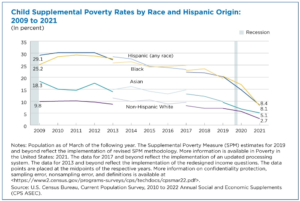The American Rescue Plan Act (ARPA) temporarily expanded the Child Tax Credit (CTC) for hundreds of thousands of Alabama children last year. The law also temporarily increased the maximum Earned Income Tax Credit (EITC) for workers without children and broadened the age range for EITC eligibility. Alabama Arise joined 51 partner organizations Tuesday in a letter asking Alabama’s U.S. senators, Richard Shelby and Tommy Tuberville, to support renewing these CTC and EITC improvements this year. The full text of the letter is below.
Letter text
Dear Senators Shelby and Tuberville,
Our nation’s historically high child poverty rate is a choice. Recent U.S. Census data reveals a fundamental truth: Congress has the power to make a different choice. Congress can and should put families and workers first by expanding the Child Tax Credit (CTC) and Earned Income Tax Credit (EITC). These strategies have proved effective to reduce child poverty and boost incomes for people who work but aren’t paid enough to make ends meet.
We, the undersigned organizations representing people with low incomes in Alabama, are writing to urge you to prioritize expanding these programs as part of the anticipated end-of-year budget bill. The time to pass these policies is now, as this may be the last chance this Congress has to act.
Even as Congress has this tremendous opportunity to deliver for families and workers, press reports indicate lobbyists are pressuring Congress to deliver more significant tax breaks for businesses and corporations. One example is the push for a tax break for companies engaged in “research and experimentation,” including tech, pharmaceuticals and other large corporations.
We urge you to put families and workers first. There should be no expanded tax breaks for businesses and corporations without expanding the CTC and EITC.
Under current law, too many children in families with the lowest incomes receive no CTC or receive a smaller credit than children in families with higher incomes. Expanding the CTC so that it reaches more of those children will go a long way toward improving families’ ability to make ends meet and reducing child poverty.
As you know, the American Rescue Plan Act (ARPA) temporarily expanded the CTC for 480,000 children in Alabama, but the expansion has expired. The overwhelming majority of families with low incomes used ARPA’s monthly CTC payments to cover everyday challenges and basic expenses, such as food, utilities, rent and diapers. Before ARPA was passed, roughly 27 million children received less than the full CTC, including many who got no credit at all — not because their families earned too much, but because of a flaw in the law that excludes kids from families with the lowest incomes. Those children excluded from the full credit include roughly half of all children in rural areas.
The Rescue Plan’s CTC expansion, combined with other relief efforts, helped lower child poverty by more than 40% between 2020 and 2021, Census data shows. Investing in children in low-income families by expanding programs like the Child Tax Credit also has shown success in improving outcomes for those children over their whole lives, including higher educational attainment, better health and higher earnings as adults.
We also urge you to expand the EITC for workers paid low wages who do not have children living with them. This part of the EITC has not been adjusted for nearly 30 years (outside of a temporary, one-year Rescue Plan expansion). As a result, about 6 million of these workers 19 and older have incomes below the poverty line, once federal taxes are taken into account. This commonsense proposal is long overdue and has enjoyed bipartisan support in the past.
Congress has a critical choice to make now: Will it expand the CTC and EITC, to put more kids on an upward trajectory for life and help working people make ends meet? Or will it go home without reaching a bipartisan agreement on these straightforward policies?
We hope we can count on you to fight for these policies to support kids and workers – and to make sure any final legislative package in December doesn’t give more tax breaks for corporations without supporting Alabamians.
Should you have any questions, please do not hesitate to contact Robyn Hyden with Alabama Arise at robyn@alarise.org. We appreciate your time and your consideration of our views.
Signatories
¡HICA! Hispanic Interest Coalition of Alabama
Advocacy for Social Justice Team of the North Alabama Conference of the United Methodist Church
AIDS Alabama
Alabama Appleseed Center for Law and Justice
Alabama Arise
Alabama Civic Engagement (ACE) Coalition
Alabama Coalition for Immigrant Justice
Alabama Council on Human Relations (ACHR)
Alabama Forward
Alabama Institute for Social Justice
Alabama Justice Initiative
Alabama Possible
Alabama State Nurses Association
Bay Area Women Coalition, Inc.
Beloved Community Church, UCC
Chat World Home Daycare
Childcare Resources
Cody S. King Home Daycare
Communities of Transformation
Community Action Association of Alabama
Community Enabler Developer, Inc.
Community Food Bank of Central Alabama
DayKara’s Group Home
Dee’s Daycare
Edmundite Missions
Fairhope Friends
Faith in Action Alabama
First Christian Church (Disciples of Christ) of Montgomery
First Presbyterian Church of Birmingham
Gadsden Outreach Ministries
Grace Presbyterian Church, Tuscaloosa
Greater Birmingham Ministries
Hometown Action
Jobs to Move America
League of Women Voters of Alabama
Monte Sano UMC
Montgomery PRIDE United
Mrs. Mazaheri’s Day Care
NAACP: Tuscaloosa Branch
Nana’s Nursery
North Alabama Peace Network
Open Table UCC
Project Hope to Abolish the Death Penalty
Redemption Earned, Inc.
Restorative Strategies
Sisters of Mercy in Alabama
SPLC Action Fund
Unitarian Universalist Church of Birmingham
University of Montevallo Alabama Arise Student Chapter
Valley Christian Church
Volunteers of America, Southeast (VOA)
YWCA Central Alabama


